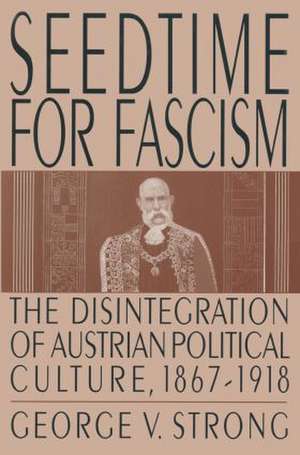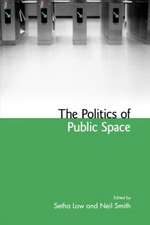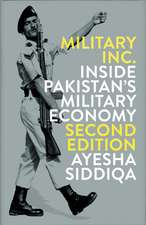Seedtime for Fascism: Disintegration of Austrian Political Culture, 1867-1918
Autor George V. Strongen Limba Engleză Paperback – 30 noi 1997
| Toate formatele și edițiile | Preț | Express |
|---|---|---|
| Paperback (1) | 318.07 lei 6-8 săpt. | |
| Taylor & Francis – 30 noi 1997 | 318.07 lei 6-8 săpt. | |
| Hardback (1) | 669.94 lei 6-8 săpt. | |
| Taylor & Francis – 30 noi 1997 | 669.94 lei 6-8 săpt. |
Preț: 318.07 lei
Nou
Puncte Express: 477
Preț estimativ în valută:
60.86€ • 63.71$ • 50.66£
60.86€ • 63.71$ • 50.66£
Carte tipărită la comandă
Livrare economică 31 martie-14 aprilie
Preluare comenzi: 021 569.72.76
Specificații
ISBN-13: 9780765601902
ISBN-10: 0765601907
Pagini: 240
Ilustrații: map, bibliography, index
Dimensiuni: 152 x 229 x 16 mm
Greutate: 0.33 kg
Ediția:New.
Editura: Taylor & Francis
Colecția Routledge
Locul publicării:Oxford, United Kingdom
ISBN-10: 0765601907
Pagini: 240
Ilustrații: map, bibliography, index
Dimensiuni: 152 x 229 x 16 mm
Greutate: 0.33 kg
Ediția:New.
Editura: Taylor & Francis
Colecția Routledge
Locul publicării:Oxford, United Kingdom
Cuprins
1. A Framework of Reference, 2. Nation and State in Danubia: Centrifugal and Centripetal Forces in Austria-Hungary, 1867-1914, 3. Kaiser as Political Icon, 4. The Austrian Idea, 5. Socialism, Nationalism, and National Socialism: Social Democracy's Struggle with National Identity in Austria-Hungary, 6. The Final Transformation: The Impact of Bourgeois Kunst and Kapital on the Austrian Idea, 7. Into the Abyss: The First World War, 8. Socialism: Between the Shoals of Nationalism and Internationalism, 9. Interment, Bibliography, Index, About the Author
Descriere
Examining the political culture in Austria-Hungary in the latter half of the 19th century, this study analyzes the centrifugal forces that arose from ethnic nationalism, dispersing the Austrian-Hungarian "state idea". It also aims to provide an explanation of developments in post-1989 Europe.













